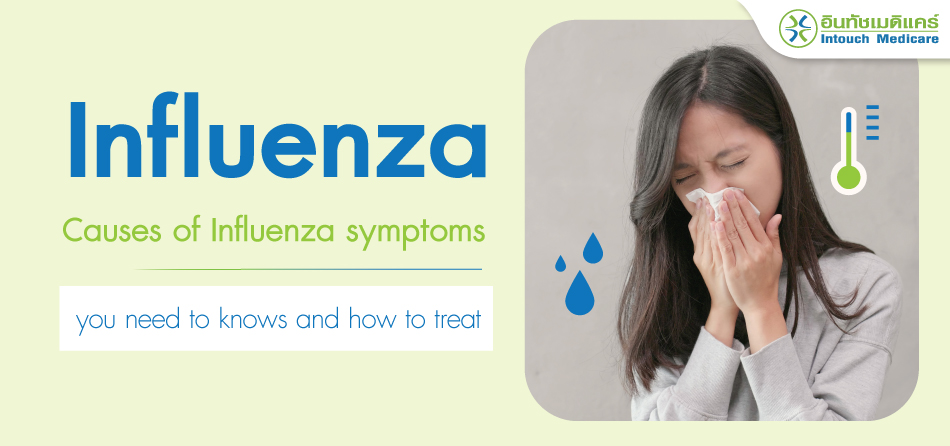Causes of Influenza symptoms you need to knows and how to treat

Influenza is a disease that can occur in people of all genders and ages. especially in children It usually spreads during the winter and rainy season. Easy to contact and has more severe symptoms than the common cold It will heal normally within 1-2 weeks. Treatment will be medication according to symptoms if there is a high fever.
If the illness does not improve within 1-2 days, you need to see a doctor for examination and close care from a doctor.
Things to know about influenza Choose the topic that interests you.
What causes influenza?
Influenza is a viral infection of the respiratory system which Caused by a virus called Influenza virus, it is much more severe than the common cold. Found in all genders and ages. It will spread a lot during the rainy season and winter.
Read more : What are the differences between influenza symptoms and common cold symptoms?
How is influenza transmitted?
It can be transmitted through breathing, coughing, sneezing, and breathing together. Or contact from hands that have the virus from touching the saliva or mucus of a sick person. Touching the nose or mouth can cause germs to enter the body.
Early symptoms of influenza
Initial symptoms of influenza that can be observed include high fever, chills, often severe body aches, especially in the upper arms, thighs, and back, extreme fatigue, stuffy nose, clear mucus, and coughing. If anyone has the symptoms mentioned above, above or have a history of close people being You should hurry to see a doctor and get diagnosed quickly.
![]()
Most cases of influenza are a fever. Body aches, fatigue, but I've met people with low fevers.
Not many symptoms, but the infection was detected. It is best if you have symptoms such as fever, cough, runny nose,
sore throat , fatigue, and body aches. It's better to hurry and see a doctor to check for the cause. ![]()
Doctor's treatment experience
WARANGKANA VIVULSIRIKUL, MD.
Symptoms that should see a doctor
Fever higher than 39 - 40 degrees Celsius And the fever does not go down after taking fever-reducing medicine within 1 - 2 days. A rash appears. You can't drink much water or eat much food. Cough a lot, have sputum. The sputum is yellow or green, indicating that there is a complicating bacterial infection. and symptoms do not improve after the fever subsides Or after the fever subsides, the fever comes back again. You should hurry to see a doctor and get a diagnosis as soon as possible.

“I have encountered a case of a girl, about 7 years old, who has never had Influenza vaccination. I had a fever, cough, sore throat, took fever reducing medicine, but the fever didn't go down. Mother went to the pharmacy and bought antibacterial medicine to take for 4 days. Her symptoms still didn't improve, so she took her daughter to the doctor.
Fever was checked and found influenza A strain. Lung x-ray was sent and pneumonia was found. In this case, hospital admission was required. Give antiviral medication and intravenous fluids.”
Doctor's treatment experience
- WARANGKANA VIVULSIRIKUL, MD. -

Mild complications
It is a condition of dehydration, sinusitis (nasal congestion, mucus, thick green sputum Pain around the corner of the eye nose and eyebrows), bronchitis (cough with mucus, difficulty breathing), bronchospasm (mucus builds up in the airways If it becomes more and more severe, it may cause you to cough up blood) and may have symptoms of inner ear inflammation. otitis media

Severe complications
Pneumonia, encephalitis, or meningitis, resulting in paralysis, convulsions, limb weakness, and coma. Pericarditis. Myocarditis, venous inflammation with thrombosis. Patients with asthma There will be more severe symptoms. There may be a relapse of the existing disease.
Groups at risk for influenza
People who are considered to be at risk for complications easily include:
People aged 65 years and over
People with chronic diseases such as diabetes , lung disease , heart disease , kidney disease , brain disease , epilepsy , blood disease , thalassemia.
People with impaired immune systems, such as those infected with HIV cancer patient People who receive immunosuppressant drugs
People who are obese, weighing 100 kilograms or more.
Children younger than 2 years, including children taking the antiplatelet drug aspirin for a long time.
Pregnant woman Pregnancy 12 weeks and up
Medical personnel close to patients

"People with pre-existing medical conditions are more at risk than usual. What the doctor had encountered was an adult case. He was a 50-year-old man with diabetes. He had a fever and runny nose. The patient thought he had a common cold. Went to the pharmacy to buy medicine and took it myself for 3-4 days and the symptoms still didn't improve. I feel very tired. Couldn't eat at all.
When he came to see the doctor Influenza B virus was detected, X-ray showed pneumonia."
Doctor's treatment experience
- WARANGKANA VIVULSIRIKUL, MD. -
How to treat the influenza
Currently, there is a drug used to treat it , name Oseltamivir, which will be most beneficial if this drug is given within 48 hours after the onset of symptoms, taking it for 5 consecutive days reduces the chance of complications. Symptoms of disease and the spread of infection to others
As for other care Medicine will be given according to symptoms like normal patients. If you have a cough and mucus, use cough syrup, phlegm dissolving medicine, and mucus reducing medicine according to the symptoms.
|

To reduce the duration of symptoms and complications
What are the consequences if the influenza isn't treated or treated slowly?
Although the influenza can go away on its own. But if treatment isn't received or treatment is delayed, it may cause complications as mentioned above. May cause death. It may also increase the severity of symptoms and increase the chance of infecting those close to you.
Interesting articles
For more info and make appointment
Hot Line 081-562-7722
Composer : WARANGKANA VIVULSIRIKUL, MD.
Last edited : 30/04/2024



